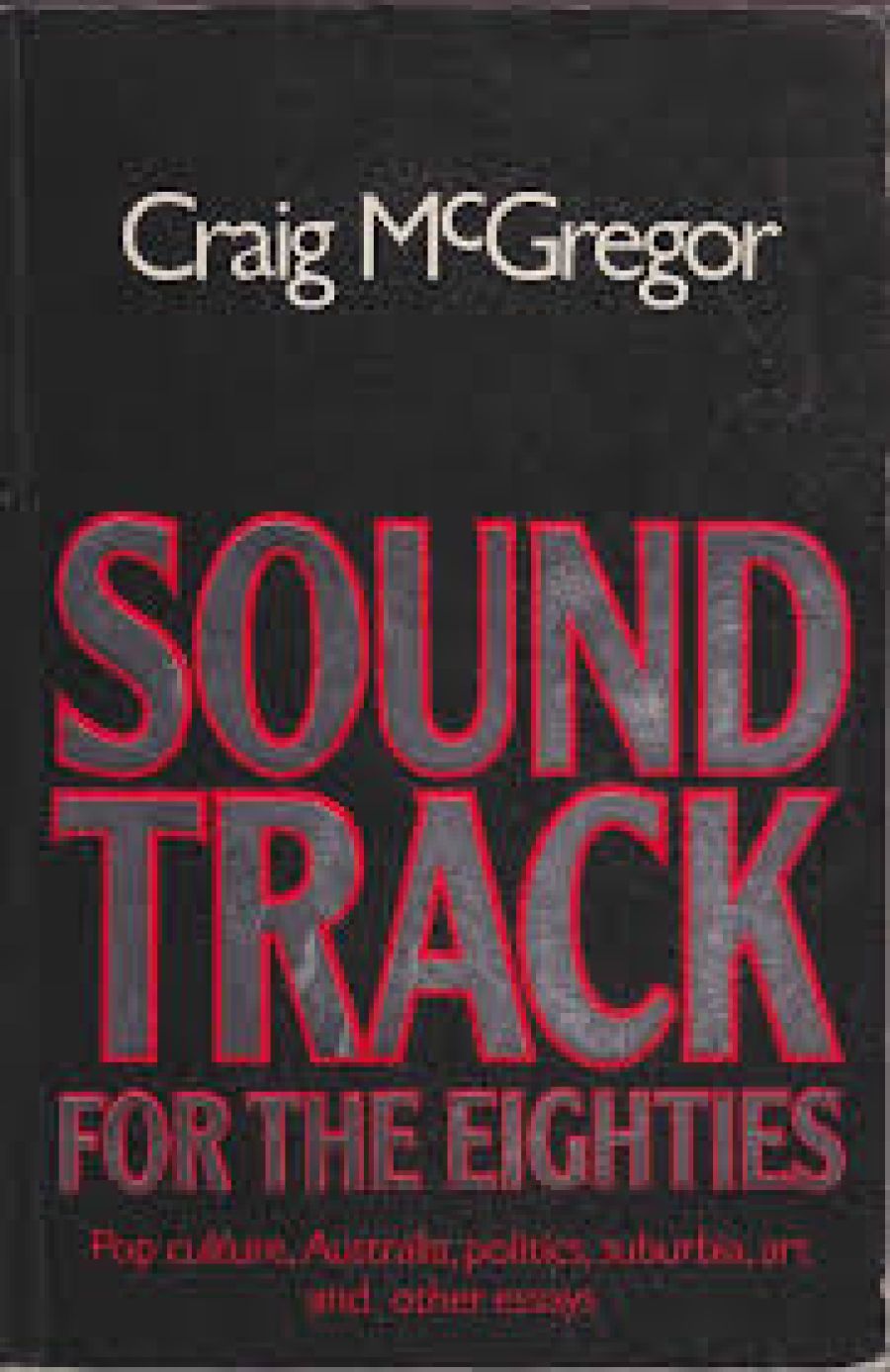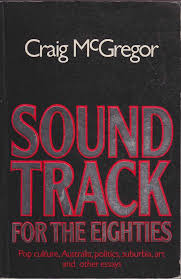
- Free Article: No
- Contents Category: Politics
- Review Article: Yes
- Article Title: Optimism and Idealism
- Online Only: No
- Custom Highlight Text:
In an essay on ‘Equality’ Craig McGregor tells us that when he was a kid he was mystified by those tales where the fisherman’s wife or whoever would be given three wishes by the Good Fairy and she ‘always wished for crazy self-indulgent things like ‘ I wish everybody I touched turned to gold’, and of course it always rebounded on them ... and I always wondered why they didn’t wish for something more general, like wishing that everyone in the world ... should be happy every afterwards, because then nothing could ever go wrong again and the world would be a perfect place to live in ... all it needed of the fishermen and fishermen’s wives and shoemakers and others was a bit of imagination, and a bit of common sense, and just a hint of generosity ... Ah! the birth of utopianism.’
- Book 1 Title: Sound Track of the Eighties
- Book 1 Biblio: Hodder & Stoughton, $24.95 hb, $12.95 pb, 206pp
- Book 1 Cover Small (400 x 600):

- Book 1 Cover (800 x 1200):

In 1984 McGregor, now aged fifty, does not believe that the human race will ever achieve the millennium. But he remains an optimist, despite his dislike of much he sees around him. especially in contemporary Australia. He argues that a better life for everyone is possible, and all that’s needed to bring this about is ‘a bit of imagination, and a bit of common sense, and just a hint of generosity’.
Sound Track for The Eighties: Pop Culture, Australia, Politics. Suburbia, Art and Other Essays contains sixteen essays grouped in five sections: Popular Culture, Oz, Alternatives, Art, Politics. Most of the essays are recent and previously unpublished. although two appeared in McGregor's previous collection: Up Against the Wall, America. At first the inclusion of these two essays in this volume appears a little incongruous: their subject is the American, not the Australian, experience, or rather McGregor’s personal American experience; they date from a decade earlier than the main body of the essays; and they are very personal and subjective in content and manner. However, these two essays do fit neatly as part of the whole, for the whole is not so much sixteen separate essays or five rather arbitrary and overlapping sections, but a group of concepts and themes which are developed consistently and thoughtfully throughout the book.
In the introduction, McGregor himself refers to three central concepts: equality, the importance of popular culture, and the liberating function of the arts. These are not new concerns for McGregor. Indeed they underlie most of his writing in the last twenty years and were apparent, if not enunciated, in his first book Profile of Australia (1966). In Sound Track for the Eighties, McGregor’s ideological and theoretical position is more clearly formulated and expressed than in his previous works. Not surprisingly then, in his essay on ‘Mass Art’ he feels able to criticise Spearritt and Walker for their “almost total lack of ideological perspective’ in Australian Popular Culture.
McGregor’s position is close to that of Ian Turner before his death: ‘Libertarian Marxist’. He is a socialist and an idealist, quoting Gramsci with enthusiasm:
Creating a new culture does not only mean one's own individual ‘original’ discoveries. It also, and most particularly, means the diffusion in a critical form of truths already discovered, their 'socialisation', as it were ... The mode of being of the new intellectual can no longer consist in eloquence, which is an exterior and momentary mover of feelings and passions, but in active participation in practical life, as a constructor, organizer, permanent persuader ...
Several essays in Sound Track for the Eighties are very much concerned with the application of theory to contemporary Australian culture: C.W.E. Bigsby’s Approaches to Popular Culture in the essay on ‘Mass Art’; Adolfo Sanchez Vazquez’s Art and Society: Essays in Marxist Aesthetics in ‘The Road from Wigan Pier to Surfers Paradise’; Carl Bogg’s Gramsci’s Marxism and Antonio Gramsci’s Prison Notebooks in ‘Hegemony in The Real World’. Others are disarmingly (and charmingly) free from external theory. The final one in the collection – ‘On Equality’ – concludes as follows:
Well, that's it. Except one last thing. I deliberately wrote this essay without rereading George Bernard Shaw, or Tawney, or Althusser, or any of the classic texts on equality, because I wanted to see if it were possible to write about it without making use of theory, but simply working from first principles. I mean, it should be clear, shouldn't it, what we should do ... maybe by just applying what used to be the old Aussie principle of fair go'. I reckon I worked out most of these things by the time I was a teenager. I remember sitting in the Cranbrook dining-room once ... Mr King ... said what I would like to do 'when 1 grew up', and ... I said I would like to do something for other people. 1 must have been eleven years old at the time. Ah, youthful idealism! But really, that’s what this essay, and this book of essays is about.
Naive? Perhaps. Subjective? Certainly. But in this subjectivity lies the strength of McGregor’s critique of society and the appeal of his proposals for change. For me personally, in the 1960s, it was McGregor’s involvement in Profile of Australia more than Donald Horne’s analysis in The Lucky Naive? Perhaps. Subjective? Cer-s Australian studies. The simplicity of McGregor’s criteria for a better world may remind us of the Good Fairy’s wish:
Equality of opportunity is merely what we start with. Then we move on to other, more important equalities, the ones I’ve talked about. Equality of reward. Equality of power. Equality of freedom. Equality of sex, race and religion. Equality of fulfilment.
But what alternative is there except the continuation of an unjust and unhappy society? Clearly, elitists and cynics will have parted from McGregor long before this. And the pragmatists will be having problems too, especially when McGregor lists the ways to remove inequalities: abolish inherited wealth, abolish private schools, abolish differential incomes, abolis sexual, racial, economic, political, media discrimination, and so on. But McGregor really believes that we can do these things. The optimism which flashes from these essays is, if anything, reinforced by the author’s anger, fierce although never strident, at the injustices inflicted on people.
... here in Australia, we waddle around in cotton wool with mortgages coiled around necks and media poison in our ears and, as I said in The Australian People, a spike driven by the industrial society right through the heart.
Fundamental to McGregor’s analyses of the present and proposals for the future is his belief in the unexpressed potential of ordinary people (of whom he confirms he is one) – ‘all ordinary people (i.e., the people) have greatness within them’. This is why so much emphasis is placed in these essays on the culture of the people, on popular/elite (low/high) culture, on counter-cultures, on the social, dynamic, reforming aspects of culture, on art as a social act, and on the arts as agents for social change. Parallel with this emphasis, naturally, runs McGregor’s concern with those elements in our society which frustrate or prevent the creative potential of the people from being expressed. Australia is ruled by a small elite, he argues. ‘Injustice is built into the very structure of the current system [but] it can be reformed’. The Australian ‘media are monopolistic, but not monolithic’. McGregor argues that so far as the media are concerned the ‘controllers are to a certain extent in the hands of the controlled’. He does not subscribe to a conspiracy theory of power in Australia, although he acknowledges specific conspiracies as in the dismissal of the Whitlam government in 1975. But then, he argues, there is no need for one, since ‘the history of our times’, as presented by the media, school curricula, churches, clubs, etc., is ‘the history of the ruling elite’.
All the essays in this book were written before the 1983 federal election. I wonder what McGregor is writing now about ruling elites and Labor governments. In 1981 he forecast, in one of the essays printed in this book, that the Labor Party would win power in Australia before the 1980s were halfway through. In this he differed from most of his fellow commentators on contemporary Australia. But that has not been unusual for McGregor. In another essay on ‘The Commentators’ he says that “the trouble with most of them (the commentators: Pringle, Horne, Conway, Moffitt, Ashbolt, Walsh, Kahn and Pepper) is that they are wrong”. To be fair McGregor is not asserting his own infallibility, but he does seem to me to have been right more often than most of the others. With Labor governments in power around Australia, the prospects should look better than ever before for achieving the kind of society idealised by McGregor. I suspect he may find it more difficult to write his future essays about Hawke’s Australia than he did those about Fraser’s Australia.
Finally I should say something about McGregor’s style in these essays. Usually it’s lively, direct and personal. Occasionally, it’s experimental, as when McGregor Zaps and Whews pop energy at us in ‘Pop Goes the Culture’. Here he puts into practice what he theorises about in his essay on ‘The Writer As Insider’: ‘... how to evolve a style which reflects the subject matter without disintegrating; how to shatter the mirror yet keep the image intact’. His metaphors are strking – “... Louis Armstrong. In the span of one man’s clenched fist, growth from archaic to classic art”. McGregor is very quotable. Concerning the power of Australia’s media monopolists he writes:
I’m reminded of what Rupert Murdoch said to Lang Hancock when he wanted to invest in Western Australia’s booming mineral discoveries and Sir Charles Court, later premier of the State, seemed reluctant to let Murdoch in. ‘Tell Charlie Court,’ said Murdoch, ‘he can have a headline or a bucket of shit a day’. Now, there's power, real power, for you.


Comments powered by CComment